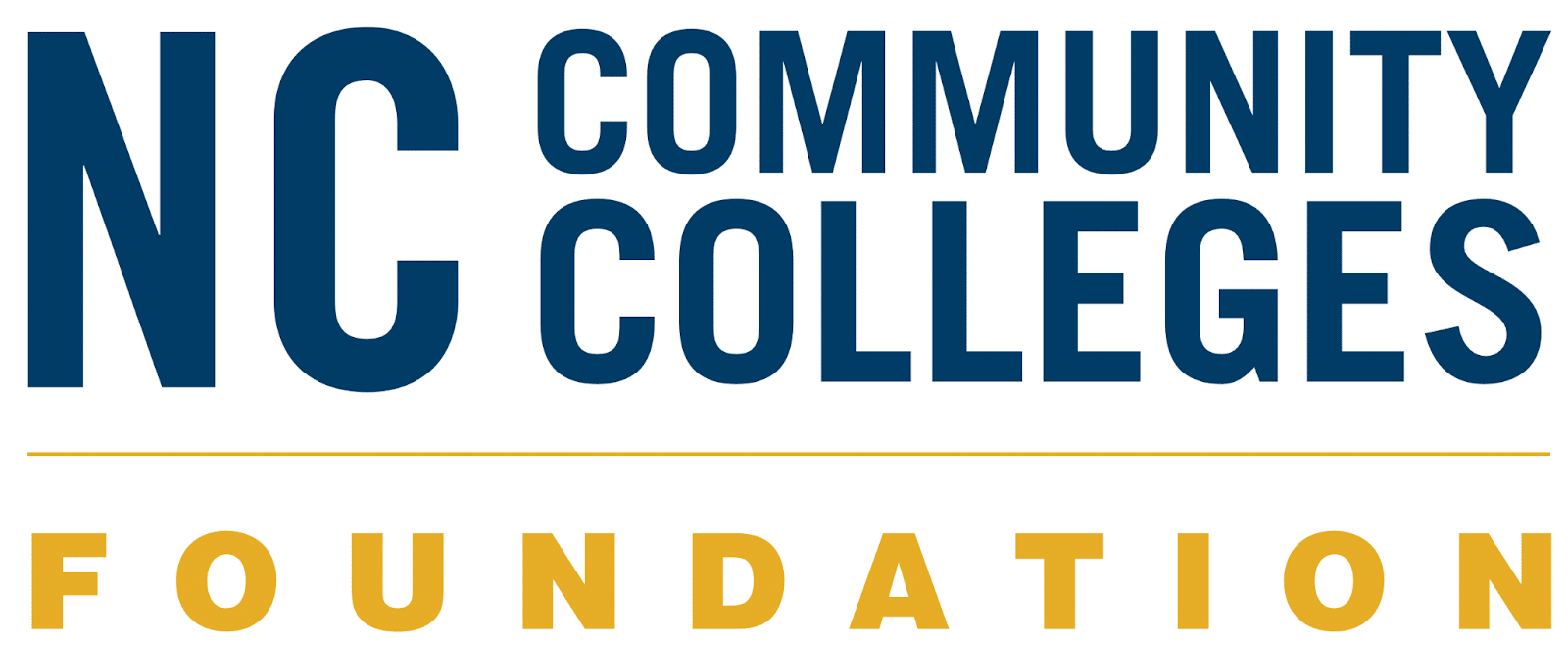
This post is written by current student Tyler Holden.
Tyler Holden is a current student in the online format. Originally from Winston-Salem, North Carolina, Holden completed his undergraduate degree in Political Science from UNC Greensboro. As a former Americorps Lead for North Carolina Fellow, he is pursuing his interests in local government and is currently employed with the Town of Hillsborough and completing his Professional Work Experience with the Hillsborough Police Department.
————————————————————————————————————–
Every year, the North Carolina League of Municipalities hosts a dynamic driver training program designed to sharpen the decision-making and driving skills of police officers across the state. Known as the “Slower is Faster” Driver Training, this hands-on experience, led by instructors skilled in the art of autocross, emphasizes precision, awareness, and thoughtful response under pressure — vital qualities for any first responder.
During the first week of my internship with the Hillsborough Police Department, I had the extraordinary opportunity to participate in this training event, held at the Winston-Salem Fairgrounds. As someone aspiring to a career in public service, this experience proved to be far more than a driving exercise — it offered deep, transferable lessons in leadership, strategy, and decision-making in government.
As part of the event, my group organized a portion of the driving course. Using road signs, inflatable deer, traffic cones, and even a remote-controlled car topped with a stuffed dog (meant to simulate a pet darting into traffic), we created a series of unpredictable obstacles. We regularly changed their positions to simulate real-world driving scenarios that officers might encounter on duty.
The objective wasn’t speed, but rather disciplined decision-making. It was about teaching officers how to remain composed, think critically, and respond appropriately in high-pressure situations.
As I observed dozens of officers navigating the course, I began noticing distinct trends. Those who accelerated too quickly on the straightaways often misjudged tight turns, leading to close calls or collisions with cones. In contrast, officers who paced themselves, slowing down strategically to assess and adapt to the layout ahead completed the course more efficiently and with greater accuracy. Just as the name of the training entails, slower really was faster. A classic case of the tortoise and the hare.
The takeaway? Rushing ahead without gauging what lies down the road often leads to errors or setbacks. But those who take the time to evaluate the landscape, anticipate obstacles, and adjust their approach accordingly tend to reach their goals more effectively.
It’s a lesson that extends far beyond the driver’s seat.
The principles behind “Slower is Faster” apply directly to leadership in local government. Just like navigating a challenging driving course, managing a municipality requires anticipating long-term needs, understanding the terrain ahead, and making deliberate, informed decisions.
Whether you’re crafting policy, managing public budgets, or planning community development, effective leadership is not always about rapid responses. It’s about thoughtful planning, steady execution, and knowing when to pause, reassess, and adapt — especially when the stakes are high.
Perhaps the most exciting moment of the training came when I had the chance to ride along with a Hillsborough Police Department officer through the full course. As we weaved through a simulated pursuit scenario complete with autocross instructors playing suspects in other vehicles, I experienced firsthand the mental and physical demands officers face when responding to emergencies.
The adrenaline, the focus, the constant decision-making — it all underscored the importance of preparation and training. It also reinforced the broader lesson: calm, measured responses are often the most effective, even in fast-paced or high-stakes environments.
Participating in the “Slower is Faster” Driver Training is a key highlight of my internship experience. It offered me not only a behind-the-scenes look at how law enforcement officers hone their skills, but also an enduring perspective on leadership, both in public safety and in public service.
As I look forward to a career in local government, I’ll carry with me the lesson that taking the time to observe, think, and plan is the best way to lead with purpose, precision, and impact.
This post was written by 2nd year student Ryan Ledbetter.
————————————————————————————————————–
My name is Ryan Ledbetter, and I am a Master of Public Administration (MPA) student at the UNC School of Government. I’m originally from Harrisburg, North Carolina, a town just outside Charlotte and right next to the Charlotte Motor Speedway. I have always been interested in government, although I didn’t initially plan to pursue an MPA. After graduating from NC State University with degrees in political science and history, I took a job in project management at a technology company. While the role offered valuable experience, it didn’t align with my interests or feel particularly fulfilling. Luckily, a few months into that position I came across a fellowship hosted by the UNC School of Government called LEAD for NC. The LEAD for NC fellowship places recent college graduates in local governments across the state to strengthen public institutions and help develop the next generation of public service leaders. I was placed with the Town of Spencer, just outside of Salisbury, where I worked on several meaningful projects, including designing and administering a school safety and support grant program, developing town policies, and gaining hands-on experience in local government operations. This was a great experience and it played a key role in shaping my decision to pursue a career in public service at the local level.
That experience ultimately led me to pursue my MPA at UNC, especially given that the School of Government is one of the top programs in the country for local government administration. I hope to use this degree to build a career in local government, with the goal of eventually serving in a city or county management role. An integral part of the UNC MPA program is the Professional Work Experience (PWE), which takes place between the first and second year. For my PWE, I am interning with the Stanly County Economic Development Commission (EDC). The EDC is responsible for promoting economic growth and job creation throughout Stanly County. It works to attract new businesses, support the expansion of existing industries, and enhance the county’s overall business climate. Through partnerships with local governments, educational institutions, and private industry, the EDC provides support for site selection, workforce development, and access to both local and state incentives.
As part of my internship, I will be developing a master list of the properties the EDC markets for economic development and working with county businesses and municipalities to create a recommended social media content plan for the next year as part of a broader marketing campaign. In addition to my work with the EDC, I will also get the chance to observe the budget process by shadowing the county manager and commissioners through attending budget workshop meetings. This opportunity is especially exciting because it allows me to gain experience in county-level administration while exploring the field of economic development for the first time.
Lilly Parker is a 2nd year student in the MPA program. As a former teacher from Kentucky, Lilly’s interests are centered around education, advocacy, and child and family welfare. She earned a BA degree in Education from Wake Forest University in 2021.
————————————————————————————————————–
From the Classroom to the Foundation: Launching My Summer with NCCCF

This summer, I’m thrilled to be serving as an advancement intern with the North Carolina Community Colleges Foundation (NCCCF) as part of my Professional Work Experience (PWE) in the UNC MPA program. The opportunity to work directly with the Foundation’s Executive Director, Katie Loovis, who also happened to be my professor for nonprofit management last semester, has been especially rewarding. Learning from her both in the classroom and now in a professional setting has provided a powerful bridge between theory and practice, and I’m excited to continue deepening my understanding of nonprofit management and advancement.
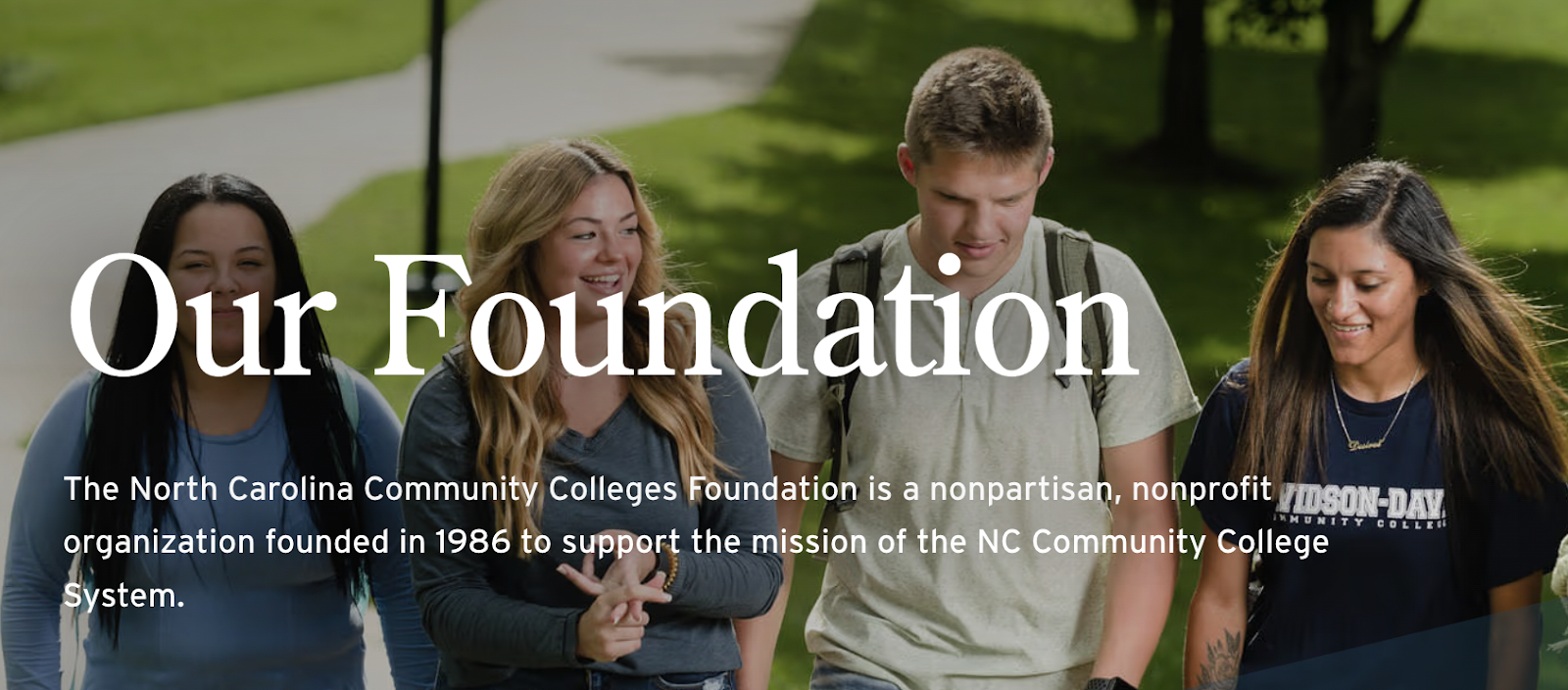
Although my PWE has only just begun, I’ve already been trusted with meaningful projects that align with my interests and push me to grow professionally. I participate in weekly fundraising strategy meetings where the team maps out how to engage funders, shape program pitches, and prepare for meetings with stakeholders. I also have regular one-on-one check-ins with both the executive director and the chief advancement officer to share updates, receive feedback, and discuss how I can continue to contribute to the Foundation’s mission.
My current responsibilities include drafting a gift acceptance policy and a gift agreement for NCCCF, as well as managing the application process for solicitation licenses in new fundraising states. The centerpiece of my summer, however, is a research project focused on nonprofit earned income strategies. I am conducting a literature review on best practices, analyzing IRS Form 990s to understand how peer foundations generate earned income, and interviewing executive directors of other community college foundations to learn from their insights. The final deliverable will be a set of strategic recommendations I’ll present to the NCCCF Board of Directors. I was able to pitch my research proposal during my first week on the job, and I’m proud to say it was met with enthusiasm.
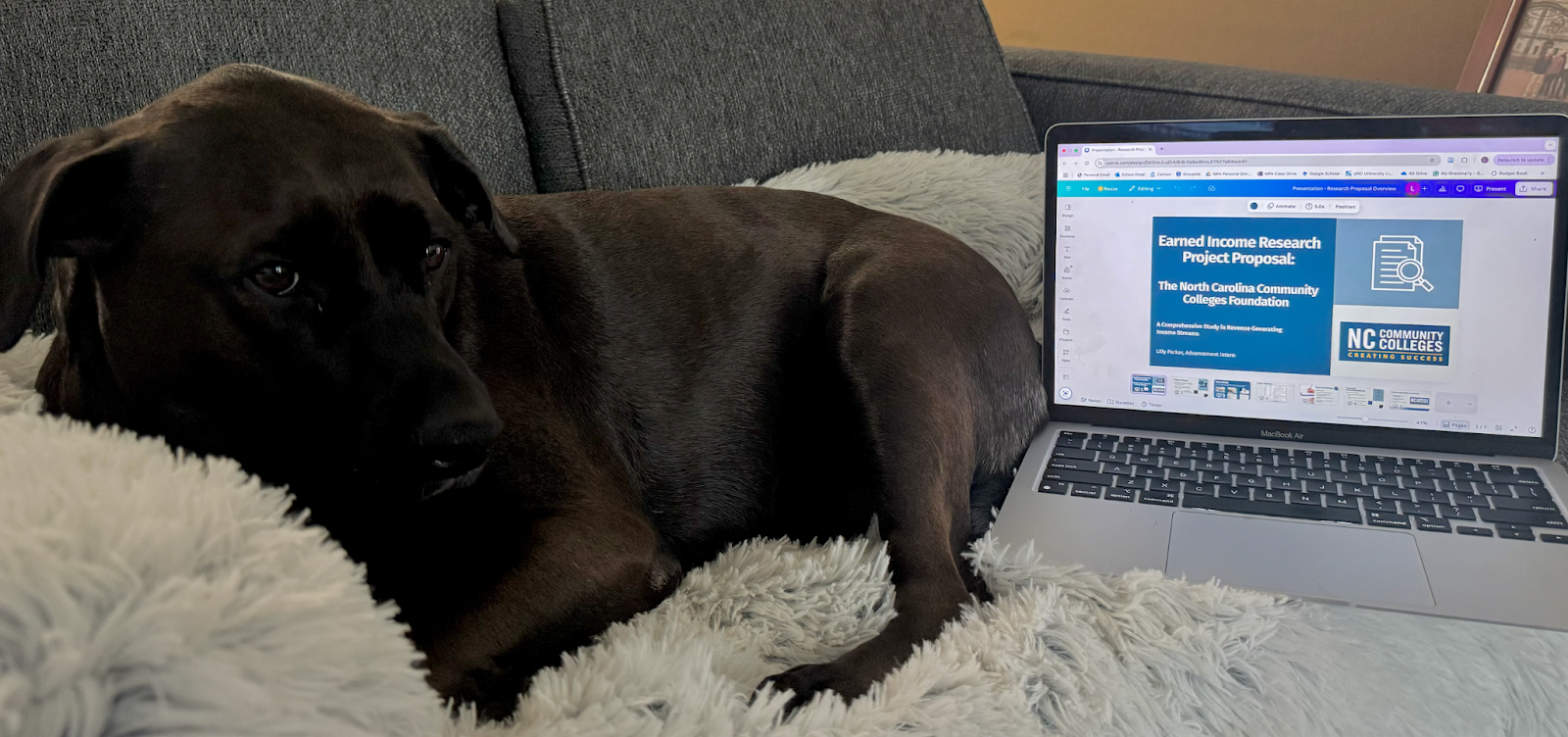
As a former teacher and current MPA student with an interest in nonprofit management and development, this experience is helping me imagine what a future career in development/advancement could look like. I feel incredibly fortunate to be working for an organization that is committed to making higher education more accessible across North Carolina, while also sharpening my skills in fundraising, research, policy writing, and professional communication. Plus, since I’m working remotely, I get to do it all with my sweet dog, Athena, by my side (see pictures)! I can’t wait to see how the rest of the summer unfolds!
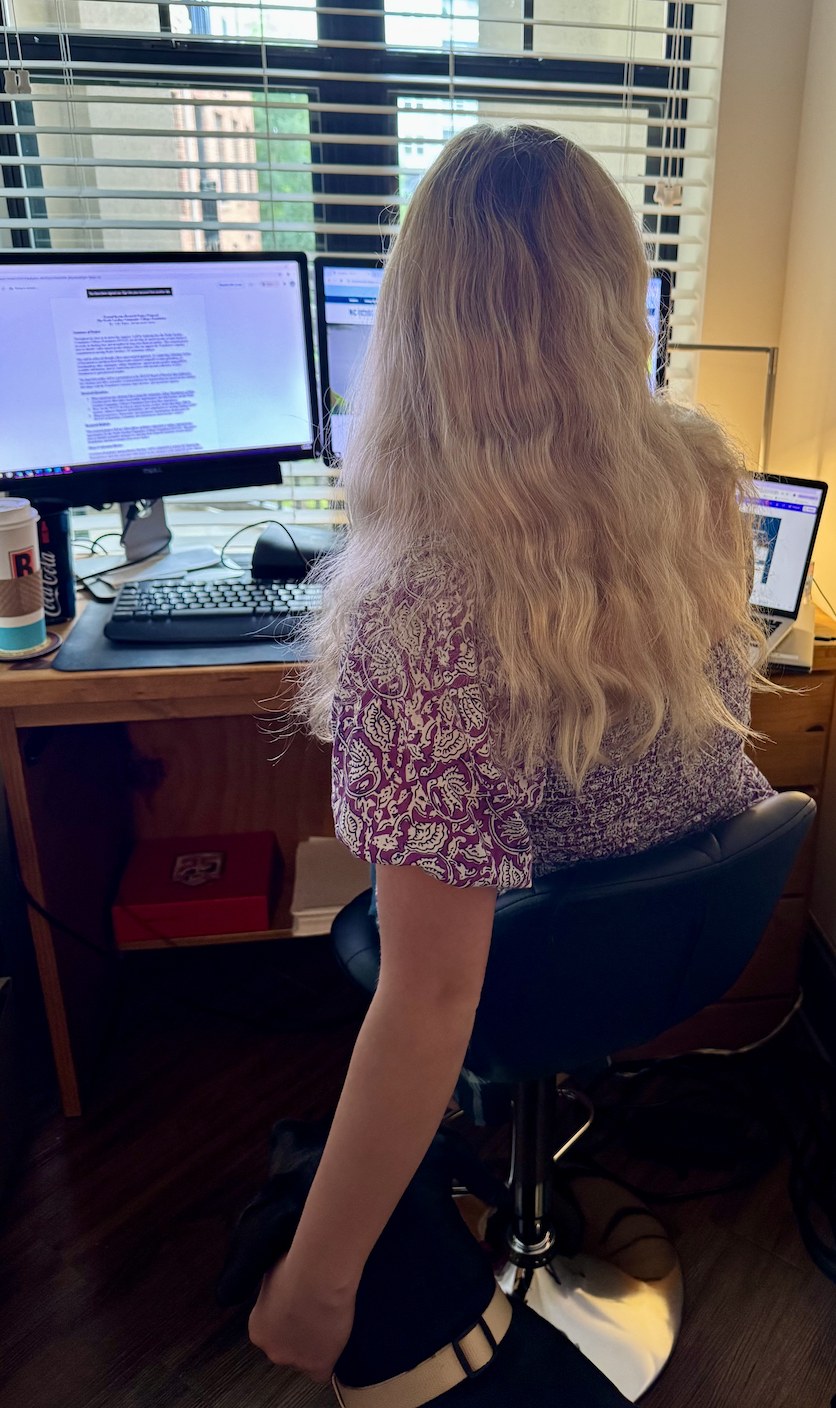
This Spring, the UNC MPA program welcomed 20 new students into the online format. From an attorney with the Federal Transit Administration to the Co-Founder and Deputy CEO of a non-profit textile innovation and sustainabilty engine, our cohort represents a wide-range of interests and experience. We have students from all parts of North Carolina, as well as students joining us from states such as Nebraska, Virginia, Utah, and South Carolina.
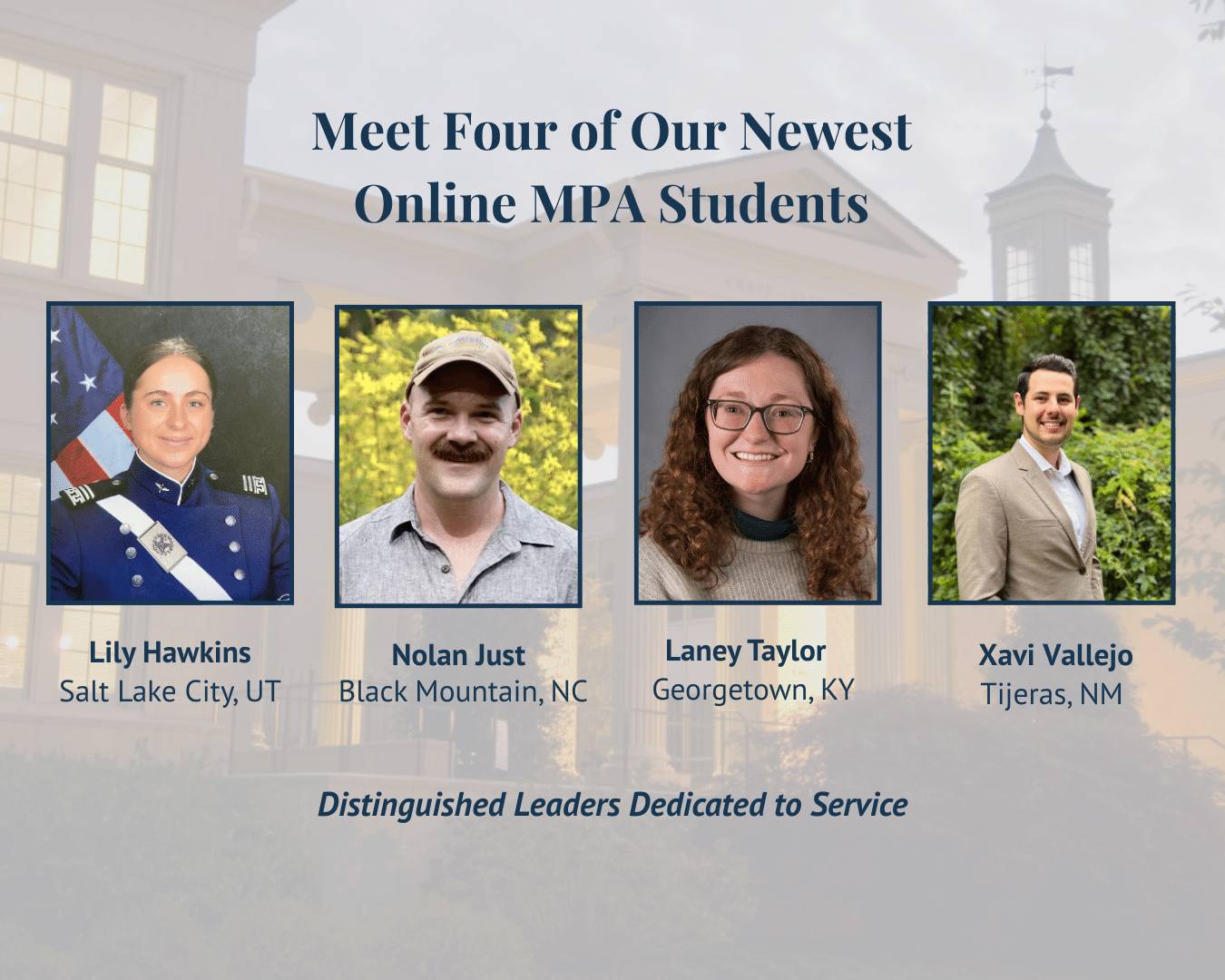
We sat down with four of them to learn a little more about them and why they’re here for the MPA.
Nolan Just – Mill Spring, North Carolina
Lily Hawkins – Salt Lake City, Utah
Xavier Vallejo – Chapel Hill, NC
Laney Madison – Georgetown, KY
This post was written by Emma Gilliam.
Emma Gilliam is a first year student in the MPA program at UNC Chapel Hill. She is the co-founder of the student organiziation Leaders for Good. Emma is from Hendersonville, NC and received her undergraduate degree from UNC with double majors in Political Science and Advertising/Public Relations.
—————————————————————————————————-
Earlier this week, I had the opportunity to attend the NC State of the Child Summit in Raleigh, hosted by NC Child and the North Carolina Institute of Medicine. I joined fellow MPA student Lilly Parker, who is also my co-founder in Leaders for Good, a student organization we created to connect graduate students interested in the nonprofit sector. Lilly is currently studying NC Child in our Organizational Theory class and was the one who connected us to this summit.
The day brought together nonprofit leaders, educators, lawmakers, public health experts, and advocates to reflect on one big question: How are we doing when it comes to the health and well-being of North Carolina’s children?
We heard from an amazing lineup of speakers, including Erica Palmer Smith, Executive Director of NC Child. She asked, “Why can’t North Carolina be number one in children?” After all, we’re already #1 in basketball (sorry, Lilly, who’s from Kentucky), #1 in BBQ, and first in flight. So why not first in making sure our kids are safe, healthy, and supported?
Governor Josh Stein also took the stage and shared highlights from his budget proposal, which includes major investments in early childhood education and family well-being. He’s proposing to expand NC Pre-K, increase teacher pay, and offer free school breakfast to all students, along with a $300 stipend for teachers to buy classroom supplies. He reminded us that affordable childcare isn’t just a family issue — it’s a workforce and economic development issue. Right now, there’s only one childcare spot for every five families, and the average annual cost is higher than in-state tuition at UNC.
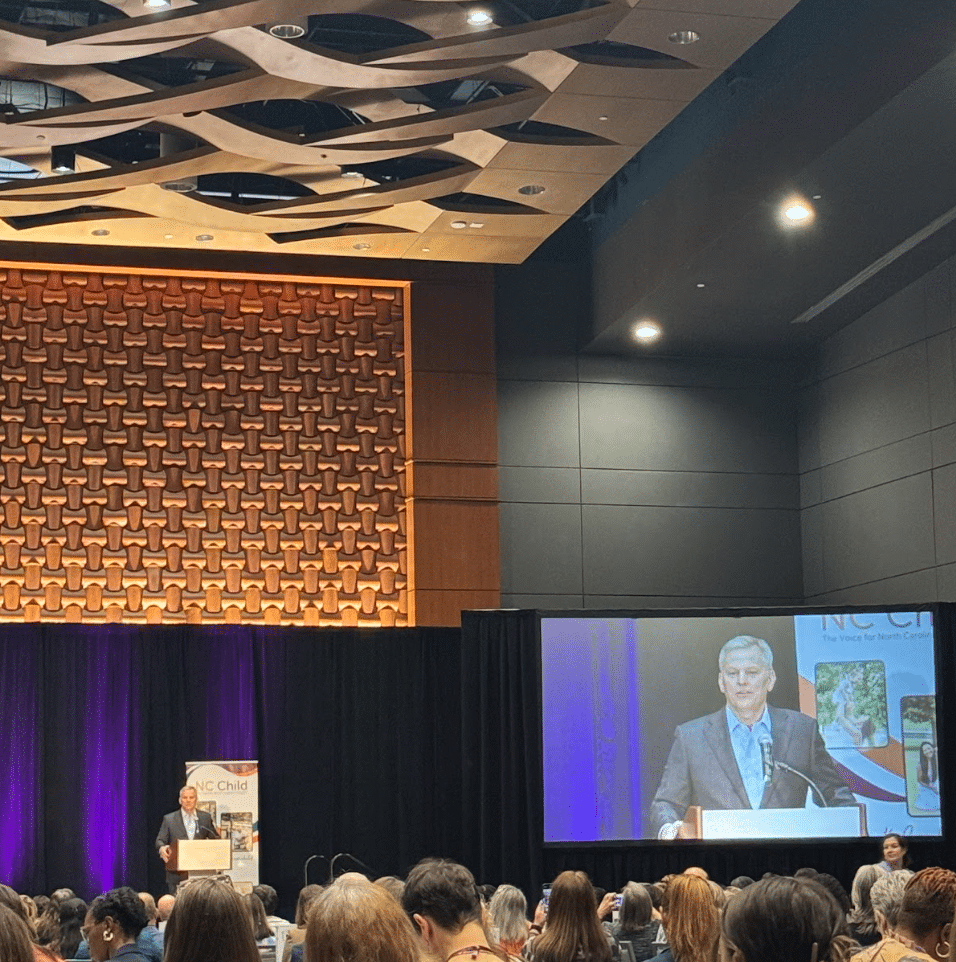
Throughout the day, we attended sessions that discussed foster care, disaster response, and food insecurity. The statistics shared were often tough to hear, like how 9.5% of NC high school students reported attempting suicide in the past year, but what came through was the need for system-level collaboration. Solving these complex issues will take shared goals, aligned policies, and sustained partnerships.
As someone from Western North Carolina, I was especially moved by the panel on Hurricane Helene’s impact. Communities are still feeling the effects of the storm, especially young people dealing with trauma. One therapist shared that many kids she works with have developed an intense fear of wind and rain. But I also saw examples of powerful community response, like the work of Centro Unido Latino Americano in McDowell County, which partnered with local government to provide translated resources and direct outreach to Spanish-speaking families.
Another session I attended focused on foster care, where I learned that 16,000 kids are in the system in NC right now. That’s not a small problem — it’s a complex, structural one. Every panelist emphasized the same solution: collaboration. We can’t solve problems like these in silos. We need shared goals, better policies, and a lot more resources.
One of the most unforgettable moments of the summit came from Rwenshaun Miller, a therapist and founder of Eustress, Inc. He held up two items: his UNC football jersey and a straitjacket. That stark visual showed his journey from student-athlete to mental health advocate. His mantra, “Be who you needed when you were younger,” resonated deeply. He now works with youth in unconventional ways, shooting hoops, drawing, playing video games, because he knows traditional therapy settings don’t work for everyone. His words were a powerful reminder of why so many of us pursue public administration: to become the kind of leader, advocate, or support system we once needed ourselves.
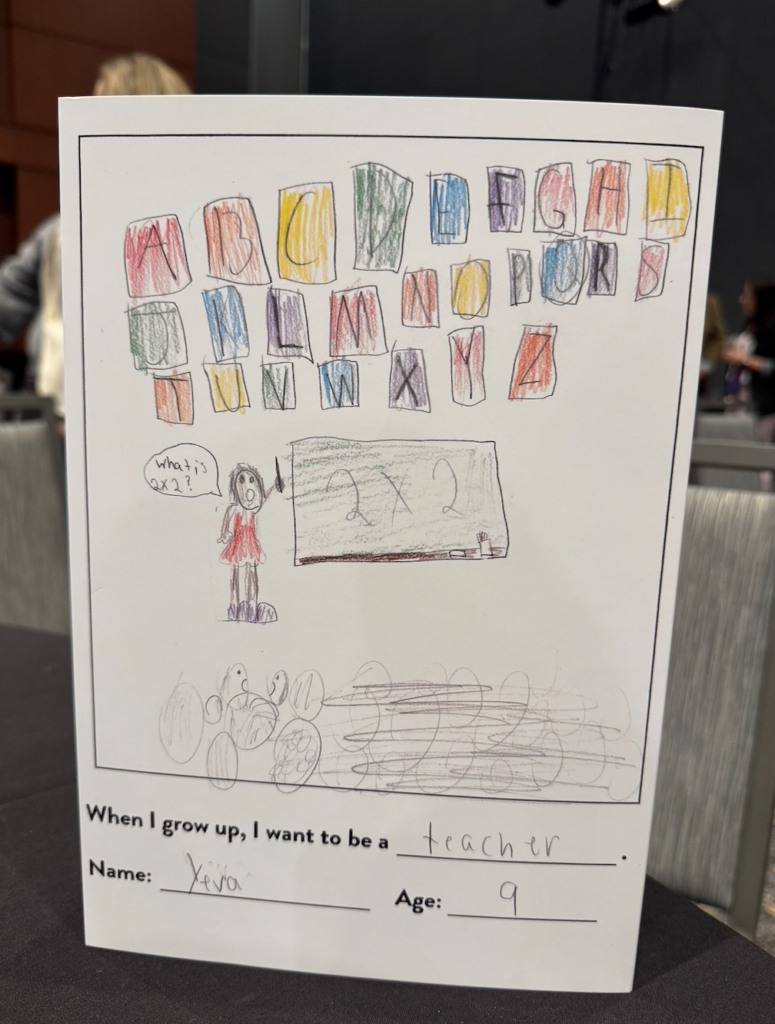
I left feeling inspired, motivated… and honestly, a little overwhelmed. There’s a lot of work to do, but this summit was a clear reminder that North Carolina is full of people committed to making things better for kids. As a public administration student, it reinforced what we talk about in class: that complex problems demand collaborative solutions. If we want lasting change, we have to work across sectors, across systems, and across differences, and do it together.
UNC MPA students Olivia Boudwin, Mason McVeety, Rachel Wooster, and Josie Zakrzewski have created an interactive StoryMap as part of the POV Project on Affordable Housing. Their project aims to challenge misconceptions, highlight key barriers, and showcase practical solutions to housing affordability in North Carolina.
Affordable housing is often misunderstood, leading to opposition that can slow or prevent progress. Through data analysis, real-world examples, and interactive storytelling, the team’s StoryMap offers a clearer understanding of what affordable housing is, who it benefits, and how it strengthens communities.
By breaking down complex issues and illustrating successful initiatives, the project encourages informed discussions and greater support for policies that promote housing affordability.
Explore their StoryMap here: Affordable Housing in North Carolina.
Q: Hi Rachel! Where’s your hometown and alma mater?
A: I am from Raleigh, NC and went to Appalachian State University in Boone, NC.
Q: What inspired you to pursue an MPA, and why did you choose UNC?
A: I have always had a passion for local government, and I noticed that many of the leaders and mentors I admired held MPAs. Having previously worked in local government, I found that UNC’s School of Government was an invaluable resource for my professional development. Additionally, UNC SOG played a crucial role in supporting the rural communities I served, which made it my top choice for my education.
Q: Can you share a bit about your background before joining the program?
I’ve had a relatively linear career trajectory, for better or for worse, LOL. I earned my undergraduate degree in public administration from Appalachian State University and then worked as a community and economic developer in Warren County, a rural area just north of Raleigh (the last county before Virginia). I later moved back to the western part of the state for an opportunity with the Western Piedmont Council of Governments as a Community and Regional Planner in Hickory, NC where I served a four-county region. There, I focused on rural capacity building, working on projects like long-range strategic and land use plans, public meeting facilitation, zoning and permitting, and supporting outdoor recreation initiatives. I’m also really lucky to have had great managers who empowered me to explore creative problem-solving and gain experience across various functions.
Q: What has been the most valuable course or experience in the UNC MPA program so far?
A: The UNC MPA program has truly allowed me to connect my passion for working in local government with the course concepts. I knew I was at the right school when my classmates and I would get together outside of class and find ourselves discussing a theory from class or a case from law. It not only helped me better understand the material (and be prepared for exams) but also gave me the opportunity to hear others’ perspectives and insights.
Q: How do you balance coursework with professional or personal commitments?
A: I currently work as program support with the Town of Chapel Hill while also being a full-time student. Balancing my schedule often comes down to setting lots of calendar reminders and prioritizing my immediate commitments for the week or day. The people in my cohort do a great job of creating opportunities for collaborative work, getting fresh air on walks, or doing something fun, like going to a play.
Q: What has been your favorite part of being in the UNC MPA community?
A: I’ve probably mentioned this a lot already, but the UNC MPA community is incredibly dedicated to supporting students in both their professional and academic goals. They go above and beyond to connect students with opportunities like mentorship, jobs, and the alumni network. It’s been really exciting to be surrounded by people who are just as passionate as I am about public service and helping communities.
Q: What advice would you give to someone considering the UNC MPA program?
A: I would tell anyone considering the UNC MPA program that it truly lives up to what it advertises and more. If you’re looking for small class sizes, a highly involved alumni network, courses and opportunities tailored to your needs and interests, and have a passion for public service, you will thrive at UNC MPA.
Q: Outside of your studies, what hobbies or interests do you enjoy?
A: I’m more of a hobby collector and tend to rotate through different hobbies and interests. However, my love for hiking has remained pretty consistent over the past couple of years. I’ve done quite a bit of hiking in North Carolina’s mountains, as well as out west in Utah, Arizona, and New Mexico. I’ll also be in Peru this summer to hike a part of Machu Picchu before my PWE.
UNC MPA provides professional development opportunities for students throughout their time in the program. Through the generous donations of alumni, the support of our career services team, and the professional development fund, we were able to support 37 students with interests in local government to attend the annual North Carolina City and County Management conference in Winston-Salem. The conference provides a networking environment to learn alongside local government leaders. While this conference traditionally is for those interested in local government and city/county management, a few of the attendees went to network and gain exposure because of the intersection local governments have with nonprofit organizations, state governments, and even the federal government. It helps students understand cross sector collaboration and intergovernmental relations.
At conferences such as NCCCMA, students receive the opportunity to mingle with faculty, alumni, and seasoned career professionals. Our career services team provided opportunities like the speed networking session, the alumni breakfast, and the Happy Hour to network at. They also encouraged students to sit at tables at with new people, not just their classmates. And they were always on hand at the conference to help introduce students to alumni through informal conversations.
Our team really encourages students to be active participants during these opportunities. Going to sessions, taking notes, asking questions, engaging at lunches, and talking to new people is what it’s all about. It is a challenging task often times for students, but gaining confidence throughout one’s time in graduate school is part of professional development. It’s part of being a leader. Finding yourself in uncomfortable situatoins and using your skills and abilities to navigate them.
We caught up with two students who attended to hear more on their experience.
————————————————————————————————————-
Victor Morats, MPA/JD student
‘NCCCMA was a great experience especially for people who are unsure about what they want to do when they graduate. Though it is very tailored towards town and city managers, I was able to have countless fascinating conversations with managers about individual service departments. The event was also very welcoming to students with countless sessions dedicated to MPA students and aspiring town managers. Though I am still not quite sure what I want to do after I graduate, I gained a lot from attending NCCCMA and have a better understanding of what a career in a city or county manager’s office would look like.’
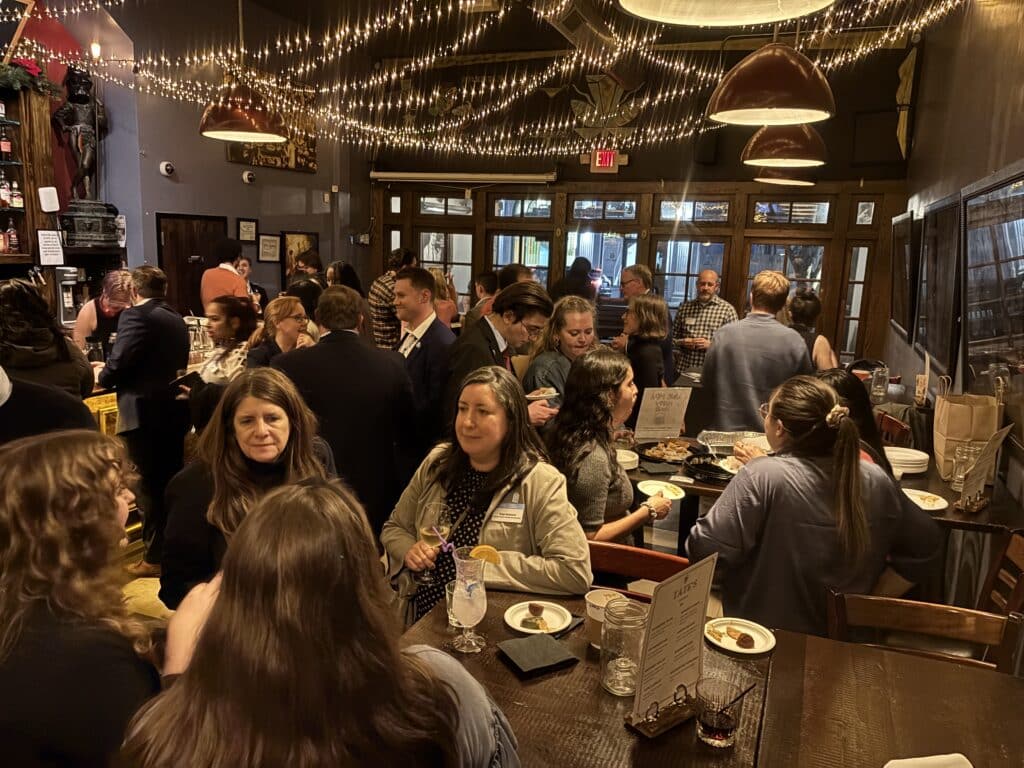
Zakiya Parker, MPA Student
‘I had a fantastic time at the 2025 North Carolina City and County Manager Association Winter Seminar (NCCCMA). From an inspiring speech by keynote speaker Sonya Hopson to networking and mini-sessions based on current workforce topics, NCCCMA did not disappoint. As a first-time conference attendee, I did not know what to expect and tried to experience everything the event had to offer. One of my favorite sessions explored how to navigate working with multiple generations by teaching the negative impacts of generational stereotypes and highlighted how each generation can learn from each other to optimize communication, work culture, and the importance of passing on skills and knowledge.
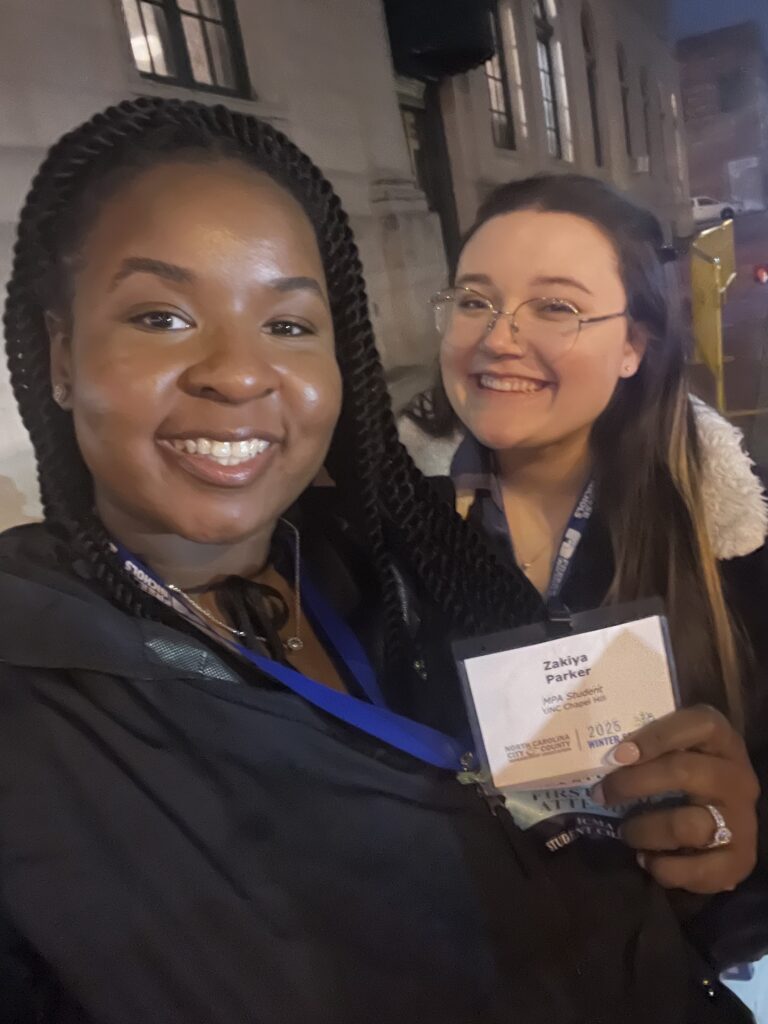
I also enjoyed the speed networking session on day two of the seminar. The session forced me out of my comfort zone and allowed me to meet and learn from several city and county managers. Each interaction felt genuine and unique. The fact that each manager I encountered was excited to share their experiences with me and provide invaluable tips made my time at the conference even more meaningful. In fact, Prior to this experience, I never considered a career in local government management. My goal has always been to work in community development or pursue a federal position. However, I am considering a new path after attending the NCCCMA seminar.‘
We interviewed current online student Allie Omens. Allie lives in Nashville, Tennessee and works as the Zero Waste Program Coordinator for the Nashville Department of Waste Services.
What’s your hometown, alma mater, and current job title/employer?
I was born and raised in San Diego, California, but made my way to North Carolina to attend UNC-Chapel Hill for my undergraduate studies. After earning my degree, I moved to Nashville, Tennessee, where I now serve as the Zero Waste Program Coordinator for the Nashville Department of Waste Services. In this role, I lead education and outreach efforts and develop special policy initiatives to help Nashville residents reduce their waste.
What inspired you to pursue an MPA, and why did you choose UNC?
Through my undergraduate studies and professional experience in waste reduction, I’ve developed a strong passion for advancing solid waste regulation to better serve communities across the United States. The MPA@UNC program offers the academic foundation and public service framework that will prepare me for greater impact in this field. It’s also a great honor to continue my education at my alma mater and the country’s first public university where faculty are deeply committed to understanding and improving government.
Can you share a bit about your background before joining the program?
Growing up in San Diego, California, I was surrounded by strong local environmental policies, which first sparked my interest in environmental regulation. My undergraduate experience at Carolina, along with the mentorship I received from UNC Public Policy faculty, helped propel my career path in local government waste and recycling services at the Metropolitan Government of Nashville and Davidson County. Before joining the UNC MPA program, I focused on policy research and stakeholder engagement for Nashville’s proposed construction and demolition diversion ordinance. Since starting the MPA program, I’ve been able to leverage my growing skillset to advance my career, taking on a leadership role as a team lead for the education and outreach division to increase community involvement in local waste services.
What has been the most valuable course or experience in the UNC MPA program so far?
One of the most impactful courses for me has been Organizational Theory. Learning different frameworks for analyzing how organizations function has given me valuable insight into leadership and strategic policy implementation. Fun fact—Org Theory was the class I sat in on when applying to the program, and it helped me decide that the UNC MPA was the right fit for me!
How do you balance coursework with professional or personal commitments?
Right now, I’m balancing full-time work, part-time studies, and planning a wedding, so I definitely know a thing or two about time management! My biggest strategy is staying organized with a written planner—I map out assignments weeks in advance to stay on top of deadlines. I also lean on my support system of family and friends, who remind me to take a step back and recharge when needed.
What has been your favorite part of being in the UNC MPA community?
I love seeing the wide range of career paths that benefit from the UNC MPA curriculum. Now that I’ve been in the program for over a year, I recognize familiar faces across my classes, and it’s been rewarding to watch how my peers apply what we learn to their professional work.
What advice would you give to someone considering the UNC MPA program?
Go for it—and be ready to hustle! The program is rigorous, but having a strong support system makes all the difference, especially for those of us in the online program balancing full-time work responsibilities. That said, I’m incredibly grateful to be part of this program, and I truly believe it’s worth the investment.
Outside of your studies, what hobbies or interests do you enjoy?
I play in a weekly co-ed soccer league, which is my favorite way to unwind after long stretches of evening classes. I also enjoy crafting, especially embroidery, and I often bring a project to my local coffee shop to take a break from studying. And if wedding planning counts as a temporary hobby, I’d add that to the list as well!
Jillian Brookshire is in her first year of the online format.
——————————————————————————————————————–
Q: What’s your hometown, alma mater, and current job title/employer?
I am originally from Raleigh, NC. I went to Campbell University for my undergraduate degree in Political Science-Public Administration. I currently work for the Town of Lillington, NC as the Planning Technician.
Q: What inspired you to pursue an MPA, and why did you choose UNC?
My sophomore year of undergrad, I took an Introduction to Public Administration course taught by my academic advisor. I always knew I wanted to serve and work in the public sector in some capacity, and after taking this class, I knew it meant pursuing an MPA. The ability to apply a theoretical lens to real-world experiences to deliver quality services and solutions to people in my community is what pushed me towards obtaining my MPA. I chose the UNC MPA program, specifically the online format, because the program prioritizes providing students with a quality education that prioritizes diversity and connection, even in the virtual format. The online program allows me to apply course content to my career every day and has made me a more well-rounded academic and professional individual.
Q: Can you share a bit about your background before joining the program?
Prior to joining the MPA Program, I graduated from Campbell University in May 2024. Upon graduation, I accepted a full-time job offer with the Planning Department at the Town of Lillington, where I completed my undergraduate internship. Going to school in a more rural area of North Carolina has given me a deep love for the resilience and community found within rural America. I hope to continue to use my knowledge and current position to advocate for economic growth and development in rural areas while still prioritizing the sense of community within these towns.
Q: What has been the most valuable course or experience in the UNC MPA program so far?
The 2024 Immersion experience has been the most valuable experience in the MPA Program so far. This year’s course focused on the challenges and benefits of AI in the public sector. The Immersion was an opportunity for me to connect with many of my online peers in person, which was very meaningful. The ability to meet so many people and learn from their professional and academic experiences was inspiring to me, as someone just starting out in the program. The Immersion also highlighted the diversity in thought housed within the MPA program, and the ability to learn from diverse perspectives heightened my worldview and made course content more applicable to the professional world.
Q: How do you balance coursework with professional or personal commitments?
Balancing coursework with a 40-hour work week is challenging – there is no denying that. I have found that dedicating a small portion of my evening, each weeknight, allows me to rest and have fun on the weekends. I find that prioritizing coursework for a few hours a day allows me to fully engage with course content, while not burning out. Also, allow yourself to have fun! Don’t ever stop doing the things you love. Let yourself take breaks from school and work to do something enjoyable and not taxing. Sometimes, that is all you need to refocus!
Q: What has been your favorite part of being in the UNC MPA community?
The UNC MPA community is so engaging and connected, even in the online format. Despite not being on campus, I still feel a strong sense of connection to the UNC Community. The MPA program does a fantastic job providing access to many on-campus activities, lectures, etc. in a virtual format, allowing online folks to connect with what’s occurring on campus. There is also a strong sense of mentorship within the online cohorts. I appreciate the connectedness between myself and peers who are ahead of me in the program. Their guidance has been so helpful to me as I am navigating my first year in the program.
Q: What advice would you give to someone considering the UNC MPA program?
If you are at all contemplating the UNC MPA Program, please attend an information session and/or visit a class! Once you learn about the program and see how the classes function, you will want to be part of this community. When I was interested in applying, I joined an informational session and talked with an alum of the program. After those two experiences, I knew that Carolina is where I wanted to pursue my degree!
Q: Outside of your studies, what hobbies or interests do you enjoy?
In my spare time, I love to play my guitar, read, get outdoors, and catch up with friends and family. Any opportunity to get outside and be in community is something I will always take advantage of.